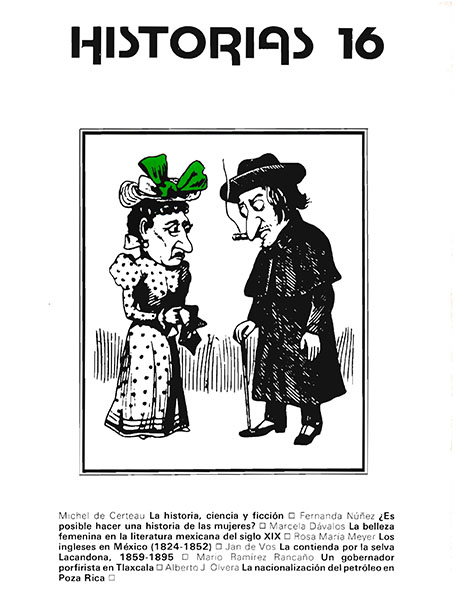Publicado 1987-03-31
Palabras clave
- Ciencia,
- Ficción,
- Historia,
- Realidad,
- Teoría de la Historia
Cómo citar
La historia, ciencia y ficción. (1987). Historias, 16, 19-34. https://revistas.inah.gob.mx/index.php/historias/article/view/15111
Resumen
Ficción es una palabra religiosa, al igual que su correlativa, ciencia. Por haber tratado en otra parte de definir su estatuto, aquí solamente se precisa, a título de nota preliminar, cuatro maneras posibles en que la ficción funciona como discurso histórico.1. Ficción e historia, 2. Ficción y realidad, 3. Ficción y ciencia y 4. La ficción y lo propio.
Descargas
Los datos de descarga todavía no están disponibles.
Referencias
- Tomado de D. Carr, W, Draf... (eds.) Philosophy, History and Contemporary Historiography, University of Ottawa Press.
- M. de Certeau, L'Ecriture de l'histoire, 2ª ed. París, Gallimard, 1978, pp. 312-368 ("La fiction de l'histoire").
- Cf. Ralph Andreano (ed.), La nouvelle histoire économique, París, Gallimard, 1977, pp. 268 y s.
- Jeanine Czubaroff, "lntellectual respectability: a rhetorical problem", en Quarterly Journal of Speach, 59, 1973.
- Jean Pierre Faye, Les langages totalitaires, París, Hermann, 1973.
- Jack D. Douglas, "The rhetoric of science and the origins of statistical social thought", en Edward A. Tiryakian (ed.), The Phenomenon of sociology, New York, Appleton-Century-Crofts, 1969, pp. 44-67; Herbert W. Simons, "Are scientists rhetors in disguise? An analysis of discursive processes within scientific communities", en Eugene E. White (ed.), Rhetoric in Transition, The Pennsylvania State University Press, 1980, pp. 115-130.
- John Craig, Theologiae chriatianae principia mathematica, London, 1699. Cf. el texto latín y una traducción de las "rules of historical evidence" en History and Theory, Beiheft No. 4, 1964.
- Condorcet, Mathématique et société, París, Hermann, 1974. Laeuestión tratada por Condorcet en 1785 ya había sido abordada por Jean Charles de Borda (Mémoire sur les élections au scrutin, 1781). Tomado nuevamente por Kenneth J. Arrow (Social Choice and Individual Values, Nueva York, 1963), recibió un tratamiento que le valió a su autor un premio Nobel.
- Cf. C.B. Macpherson, The Political Theory of Possessive Individualism, Oxford, Clarendon Press, 1962; Alan Macfarlane, The Origins of English Individualism, Cambridge University Press, 1978.
- Cf. Morris Kline; Mathematics in Western Culture, Oxford University Press, 1972, pp. 190-286.
- Cf. por ejemplo "IBM ou l'emergence d'une nouvelle diétature", en Les Temps Modernes, No. 351, octubre de 1975.
- Cf. Peter Hanns Reill, The German Enlightenment and the Rise of Historicism, University of California Press, 1975, p. 231.
- Cf. M. de Certeau et al., Une politique de la langue, París, Gallimard, 1975, cap. 4, "Théorie et fiction (1760-1780): De Brosses et Court de Gébelin".
- Cf. por ejemplo Charles Corge, Informatique et démarche de l'esprit, París, Larousse, 1975.
- Sobre el análisis histórico por cómputo, cf. Charles Tilly, "Computers in historical analysis", en Computers and the Humanities, vol. 7, No. 6, 1973, pp. 323-335.
- Cf. Fraçois Furet, "Le quantitatif en histoire", en Jacques Le Goff y Pierre Nora (ed.), Faire de l'histoire, París, Gallimard, 1975, I, pp. 42-61.
- Charles Tilly, op. cit., pp. 333-334.
- Sobre esa "vuelta" del pasado en el presente, cf. M. de Certeau, "Histoire et psychanalyse", en Jacques Le Goff et al., La nouvelle histoire, París, CEPL, Retz, 1978, pp. 477-487.
- En el plano colectivo aparece el mismo problema, como lo muestra, por ejemplo, la relación difícil que mantiene la nueva historiografía negra africana, de tipo nacionalista, con la pluralidad étnica de su objeto-sujeto. Cf Bogumil Jewsiewicki, "L'histoire en Afrique et le commerce des idées usagées", en Canadian Journal of African Studies, vol. 13, No. 1-2, 1979, pp. 69-87.
- Paul Veyne, Comment on écrit l'histoire, París, Seuil, 1971.
- Albert O. Hirschman, The Passions and the Interests. Political Arguments for Capitalism before its Triumph, Princeton University Press, 1977; y Private Interest and Public Action, ibid., 1982.
- Martin Duberman, Black Mountain. An Exploration in Community, Nueva York, Dutton, 1973.
- Regine Robin, Le cheval blanc de Lénine ou l'histoire autre, Bruselas, Complexe, 1979.
- Cf. Marc Fumaroli, "Les Mémoires du XVIIe siécle au carrefour des genres en prose", en XVIIe siécle, No. 94-96, 1971, pp. 7-37; F. Smith Fussner, The Historical Revolution. English Historical Writing and Thought, 1580-1640, Westport, Greenwood Press, 1962, pp. 299-321.
- Una teoría de las ficciones lingüísticas (manipulaciones y proyectos en el campo del lenguaje) y del simbolismo (en particular de los "incomplete symbols") permite a Jeremy Bentham analizar los efectos de lo real propios del fictitius y las operaciones efectivas ligadas a una lógica del "como si". Cf. C.K. Ogden, Bentham's Theory of Fictions, Londres, Kegan Paul, 1932.

